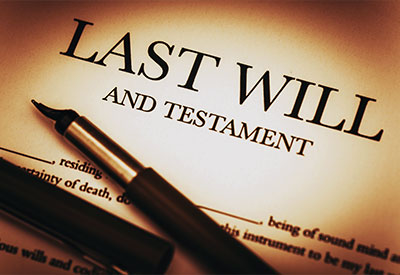Despite the importance of estate planning, many Americans overlook this important obligation, believing that doing nothing is a viable option. This misconception can lead to unintended consequences, as state laws will dictate the distribution of your assets in the absence of a formal estate plan. This article explores the popular misconception of "doing nothing," the consequences of not having an estate plan (intestacy) and the tools available to maintain control of your legacy that include a last will and testament, trusts, powers of attorney and other legal documents.
What are the consequences of not having an estate plan?
The most significant consequence of not having an estate plan is that state laws will determine how your assets are distributed. Each state has its own set of intestacy laws, which dictate the default outcomes for individuals who die without a will. These laws vary but generally follow a similar pattern:

- Spouse and children. If you are married and have children, your assets will typically be divided between your spouse and children. The exact distribution depends on state laws, but it may not align with your wishes.
- No spouse or children. If you are unmarried and have no children, your assets will be distributed to your closest relatives, such as parents, siblings or extended family members. This distribution may not reflect your preferences.
- No living relatives. If you have no living relatives, your assets will escheat to the state, meaning the state will take ownership of your property.
In addition to the distribution of assets, not having an estate plan can lead to other complications:
- Probate process. Without a will, your estate will go through the probate process, which can be time-consuming, costly and public. The court will appoint an administrator to manage your estate, which may not be someone you would have chosen.
- Guardianship for minor children. If you have minor children and no estate plan, the court will decide who will become their guardian. This decision may not align with your preferences, and the process can be stressful for your family.
- Health care and financial decisions. Without an estate plan, you will not have designated individuals to make health care and financial decisions on your behalf if you become incapacitated. This can lead to disputes among family members and decisions that do not reflect your wishes.
How do state laws and probate dictate default outcomes?
State laws play a crucial role in determining the distribution of assets for individuals who die without an estate plan. These laws, known as intestacy laws, vary by state but generally follow a hierarchy of relatives. Here are some key points about how state laws and the probate process dictate default outcomes:
- Spousal rights. In most states, a surviving spouse has a right to a significant portion of the deceased's estate. This portion can vary but often includes a share of the estate and certain exempt property, such as the family home and personal belongings.
- Children's rights. If the deceased has children, they are typically entitled to a portion of the estate. The distribution may depend on whether the children are from the current marriage or previous relationships.
- Extended family. If the deceased has no surviving spouse or children, the estate will be distributed to other relatives, such as parents, siblings, nieces and nephews. The specific order of priority varies by state.
- Escheat to the state. If the deceased has no living relatives, the estate will escheat to the state. This means the state will take ownership of the assets, which can be a significant loss for any distant relatives or friends who might have been preferred beneficiaries.
- Probate court involvement. The probate court oversees the distribution of the estate according to state laws. This process can be lengthy, costly, burdensome and public, which may not align with the deceased's wishes for privacy and efficiency.
What estate planning tools can help maintain control and personalize decisions?

To avoid the default outcomes dictated by state laws, individuals can employ a variety of estate planning tools to maintain control and personalize decisions regarding their assets and end-of-life care. One of the most fundamental tools is a will, which is a legal document that outlines how you want your assets distributed after your death. A will allows you to name beneficiaries for your assets, appoint an executor to manage your estate, designate guardians for minor children and specify your wishes for funeral arrangements. By creating a will, you ensure that your assets are distributed according to your wishes and help streamline the probate process.
Trusts are another powerful estate planning tool. These legal arrangements allow you to transfer assets to a trustee, who manages them on behalf of beneficiaries. Trusts offer several benefits, including avoiding probate, maintaining privacy and providing greater control over asset distribution. There are various types of trusts, such as revocable living trusts, irrevocable trusts and special needs trusts, each serving different purposes and offering unique advantages.
Powers of attorney are essential documents that designate someone to make financial and legal decisions on your behalf if you become incapacitated. There are two main types: a durable power of attorney, which grants broad authority to manage your financial affairs, and a limited power of attorney, which grants specific authority for particular tasks or periods. Having a power of attorney ensures that someone you trust can manage your affairs if you are unable to do so yourself.
Advance health care directives, also known as living wills, are crucial for outlining your wishes for medical treatment if you become incapacitated. These documents typically include a health care proxy, which designates someone to make medical decisions on your behalf, and a living will, which specifies your preferences for end-of-life care and other medical treatments. Advance health care directives ensure that your medical wishes are respected and can prevent disputes among family members.
Beneficiary designations are another important aspect of estate planning. Certain assets, such as life insurance policies, retirement accounts and payable-on-death accounts, allow you to name beneficiaries directly. These designations take precedence over your will and can help ensure that assets are distributed according to your wishes.
Lastly, if you have minor children, designating guardians in your will is crucial. This ensures that someone you trust will care for your children if you are no longer able to do so. By utilizing these various estate planning tools, you can maintain control over your assets, ensure your wishes are respected and provide for your loved ones even after you're gone.
What are the consequences of not having an estate plan?

Failing to create an estate plan can lead to several negative consequences, including:
- Loss of control. Without an estate plan, state laws will dictate how your assets are distributed, which may not align with your wishes.
- Probate process. Your estate will go through probate, which can be time-consuming, costly, inconvenient and public.
- Family disputes. The lack of clear instructions can lead to conflicts among family members over asset distribution and decision-making.
- Increased taxes and expenses. Without proper planning, your estate may face higher taxes and administrative costs.
- Guardianship issues. If you have minor children, the court will decide who becomes their guardian, which may not reflect your preferences.
- Difficult health care decisions. Without advance directives, your medical treatment preferences may not be followed, and family members may disagree on your care.
How can working with an estate planning professional help?

Working with an estate planning professional, such as a Legacy Plan Network Attorney, can provide several benefits:
- Experienced guidance. Estate planning professionals have the knowledge and expertise to help you navigate complex legal and financial issues.
- Customized plans. They can create personalized estate plans that reflect your unique circumstances and goals.
- Legal compliance. Vetted professionals ensure that your estate plan complies with state laws and regulations.
- Tax efficiency. They can help you develop strategies to minimize estate taxes and other expenses.
- Peace of mind. Knowing that your affairs are in order can provide peace of mind for you and your loved ones.
What are some common misconceptions about estate planning?
Estate planning is often misunderstood, leading many individuals to delay or avoid this crucial financial step. One common misconception is that estate planning is only necessary for the wealthy. In reality, estate planning is essential for individuals across all income levels to ensure their assets, regardless of size, are distributed according to their wishes. Another prevalent myth is that young people don't need estate plans. However, unexpected events can occur at any age, making it vital to have a plan in place early on.
Many people also believe they don't have enough assets to warrant an estate plan. This is a dangerous misconception, as even modest assets benefit from proper planning to ensure they're distributed as desired and provide for loved ones. Some individuals think they can handle estate planning themselves using DIY tools. While these resources exist, working with a professional can ensure your plan is comprehensive, legally sound, and tailored to your specific needs.
Lastly, there's a tendency to procrastinate, with people believing they can always update their plan later. This approach can lead to unintended consequences if unexpected events occur before a plan is in place. It's crucial to create an estate plan as soon as possible and update it regularly to reflect life changes. By addressing these misconceptions, individuals can better understand the importance of proactive estate planning for their financial future and the well-being of their loved ones.
Conclusion
While doing nothing may seem like a free option for estate planning, it comes with significant risks and potential costs. State laws will dictate the distribution of your assets, which may not align with your wishes, and the probate process can be time-consuming and costly. By using estate planning tools such as wills, trusts, powers of attorney and advance health care directives, you can maintain control over your assets and help ensure your wishes are followed. Working with an estate planning professional can provide expert guidance and peace of mind, helping you create a comprehensive plan that reflects your unique circumstances and goals.



